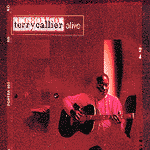 |
 |
|
|
|
| |||
 Terry Callier
Terry CallierAlive [Mr. Bongo] Rating: 7.2 Updating Andy Warhol's threadbare observation that everyone has their fifteen minutes of fame, I'd like to suggest that everyone in our Western broadband hemisphere can become an icon. Anyone's creative labors can be digitally stored and sent around the world, collecting ever more devotees as multi-megabyte attachments are opened to be stored on multi-gigabyte hard drives. Who knows? But the winsome poetry you composed in homeroom for the girl with Pre-Raphaelite curls has reached iconic status somewhere in the world. You've joined the other greats: Miles Davis, Sun Ra, Harry Smith, Willem de Kooning, Tupac Shakur, David Byrne. Each of these figures unquestionably transformed into meta-persons; their meta-selves stand as signifiers of lifestyles, artistic visions, or hang-ups. Such is the inevitable result of a massively available and digitized culture. But away from the obvious candidates for ascension, hipsters and members of squabbling elites are bound to define themselves by their adherence to more obscurantist canons. Thus, Todd Solondz and Yoko Ono have their unquestioning acolytes, as do the Lords of Acid. Amongst the senior members of the Hoxon Square soul-jazz-funk clique, only Shuggie Otis rivals the hitherto obscure folk singer Terry Callier in devotion. Paul Weller has expressed his adoration for Callier, as has Gil Scott Heron. Gilles Peterson's estimation for him is so huge that Peterson's Talkin' Loud label financed Callier's preciously glossy Lifeline album. "Pass in Time," Beth Orton's collaboration with a spectral-voiced Callier, endeared him to thousands of newlywed Pottery Barn customers. No surprise then that Soho boutique/label Mr Bongo (who, naturally, also have a boutique outlet in Shibuya) have captured Terry Callier live in concert and issued an entire disc's worth of his guileless acoustic strummings and his backing band's earnest folk jazz meanderings. The litmus test here is whether you'll feel elevated by 76 minutes of studious jazz-folk or capsized by it. Alive allows for no middle ground. From the opening picks of Callier's guitar to the closing swollen emotions of the audience, you encounter revered seriousness. And Callier's subject matter is worthy of serious debate. "Step into the Light" tackles the plight of inner city youth, but rather than suggest a workable solution, Callier trots out platitudes and New Age whibble that hardly count as meaningful contributions. Before I get yelled out for being insensitive, let me remind everyone how ill they feel whenever Bono makes such pronouncements. If the Pope himself came up with vacuous hectoring, I'd be just as outraged. Fortunately, people of sense and intellect know that a pop song is not the optimum forum for public discourse. Zack de la Rocha, for all his talents, is an eloquent rabblerouser, but he's hardly an engineer of social change. Callier gets all Gil Scott Heron on us during his lament for the death of Amadou Diallo, "Lament for the Late AD." At least when The Bruce dealt with this subject in "American Skin (41 Shots)" he was courageous enough to present the police officers' perspective as well as that of the slain. Away from empty-headed political self-righteousness, Callier can work small miracles. "African Violet" is as bewitchingly perfumed a ballad as you could hope to wake up to. "Ordinary Joe," a longtime resident of the Callier songbook, is a serenely scatted, breezily fluted paean to pretencelessness. "Lazarus Man" is a confessional ghost tale augmented by more gorgeous flute improvisations. Originally debuted on 1973's What Color is Love, "Dancing Girl" is stripped of orchestration and is transformed into a lilting drift through childhood-reveries-turned-heroin-nightmares, accompanied by more glimmering flute lines. The hush of the audience is palpable during the calm interplay between the electric piano and Callier's stark picking. The crowd goes politely hysterical for his graceful rendition of "I Don't Wanna See Myself." I'm sure they left the room feeling spiritually nourished and not minding that the true Messiah's taking his time to manifest Himself on Earth again. But for a performer so often described as "magical," I find that Callier's coffeehouse style of singing is insufficient to warrant such excessive adulation. So his rise to icon status must be based on something else. Given the data-rush of our lives-- the ubiquity of processor-controlled devices from smart fridges to keyless car door locks-- the iconization of Callier seems more like a style mag-sanctioned Luddite backlash. Adoring this man, I think, has little to do with his talents. If that were the case, Andy Bey would be as lauded. Granted, Gilles Peterson did compile Bey's elemental version of Nick Drake's "River Man" for his Incredible Sound Of album. But Bey most likely doesn't want to be a myth. Callier has allowed his time away from music in the 80's and his job as a computer programmer to be spun as his wilderness years-- the decade that left him abandoned by his muse. This is all nineteenth-century Romantic twaddle. It's the same twaddle that states that the pre-literate tabula rasa of the infant mind is a culturally unpolluted Eden in which rapturous ideas and thoughts of social cohesion gambol about without even a hint of rage, negativity, or struggle. This unreality is the breeding pen of sociopaths, Civil War re-enactors, and weak-minded Baby Booming complainers. It's not Callier's fault. I'm sure he never yearned to become anyone's salvation. Callier's devotees do him a dishonor by making him the paradigm of all that is raw, honest, and unspoilt by technology. The guy worked as a computer programmer for crying out loud! Callier's acolytes are uneasy with the prevalence of Missy Elliot, trance, glitch, and wireless Internet. Large chunks of life today piss me off, too, but I don't go putting my faith in a minor celebrity. Alive has strengths and weaknesses in equal share. Just like life. Deny that truth and you're nothing more than a weenie walking into a mirage.
|
|||

